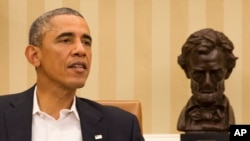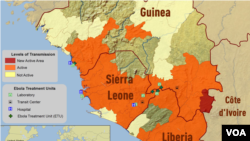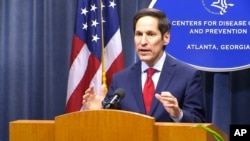President Barack Obama spoke with world leaders and was briefed by his public health and national security teams Monday on international and domestic efforts to confront the Ebola epidemic.
U.S. public health officials are “rethinking” the way they address effective Ebola infection control following the first U.S. case of the deadly virus in Texas.
Speaking with U.N. Secretary-General Ban Ki-moon by phone, Obama agreed on the need for more “robust commitments and rapid delivery of assistance” to West Africa “to stop the epidemic at its source.”
In a separate conversation with his French counterpart, Francois Hollande, Obama discussed coordinated actions to contain the epidemic, including treatment facilities in West Africa and passenger screening.
Second US Ebola case
The president was also briefed on the response to the diagnosis of a second U.S. Ebola case, a nurse, in Dallas, Texas, including the investigation into the apparent breach of infection control protocols.
Media reports have identified the patient as 26-year-old Nina Pham, who cared for Liberian Thomas Eric Duncan, who died last week at Texas Health Presbyterian Hospital after arriving in the U.S. in September. She is now in isolation and in stable condition.
At a news conference Monday, the director of the Centers for Disease Control, Tom Frieden, said this case changes some things, but not others.
"It doesn’t change the fact that we know how Ebola spreads. It doesn’t change the fact that it’s possible to take care of Ebola safely," Frieden said.
"But, it does change substantially how we approach it. We have to rethink the way we address Ebola infection control because even a single infection is unacceptable," he said.
Frieden said none of the 48 people who had contact, or may have had contact, with Duncan have developed symptoms.
He said only one person may have had contact with the nurse, and that person is being monitored.
The Associated Press reported about 70 staff members at Texas Health Presbyterian Hospital were involved in the care of Duncan, including the nurse. Frieden said they are being interviewed and monitored.
"If this one individual was infected, and we don’t know how, within the isolation unit, then it is possible that other individuals could have been infected as well. So we consider them to be potentially at risk and we’re doing an in-depth review and investigation," said Frieden.
Investigation
The CDC director also said an investigation is underway into how the nurse could have become infected.
"We look at what happens when people go into isolation, what happens in isolation and what happens when they come out of isolation. And, we’re particularly concerned about that third process, taking off the isolation personal protective equipment because, if it is contaminated, there is a possibility a worker will contaminate themselves and become infected in that process," Frieden said.
Frieden said new guidelines have been implemented including new training of health care workers, the type of protective equipment they wear and the use of disinfectants as they leave an isolation unit.
He added that every U.S. hospital must think about the possibility of Ebola when dealing with any patient with a fever, or other Ebola-like symptoms, who has traveled to Guinea, Liberia or Sierra Leone in the previous three weeks.
Frieden cautioned more cases of Ebola in the United States are possible, especially among the health care workers who treated Duncan.
Multiple levels of protection
Frieden said U.S. health authorities are looking at multiple levels of protection, including the screening of people on departure flights in the three affected West African countries. All are given a questionnaire and have their temperature taken.
He said nearly 80 were denied travel after displaying fever in the past two months, but none had Ebola.
Sunday, U.S. authorities began a similar screening of people coming from the three countries at New York’s JFK International Airport. He said 91 people were identified. None had a fever.
Of those, five were given additional evaluation, but none were determined to have been exposed to Ebola.
Similar procedures are being put in place Thursday at four other so-called "gateway" airports, including Washington's Dulles, Newark’s Liberty, Chicago’s O’Hare and Atlanta’s Hartsfield-Jackson.












